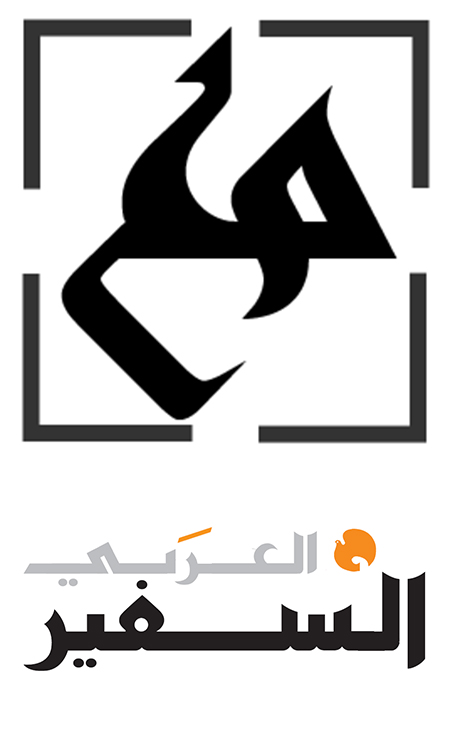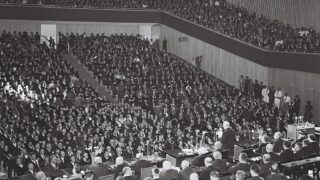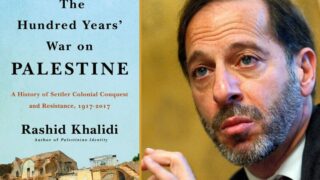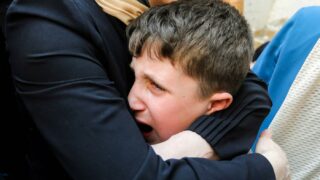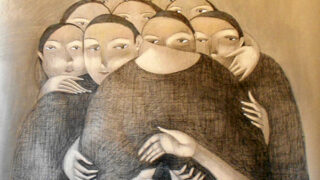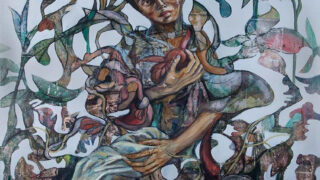" This file was produced as part of the activities of the Independent Media Network on the Arab World. This regional cooperation brings together Maghreb Emergent, Assafir Al-Arabi, Mada Masr, Babelmed, Mashallah News, Nawaat, 7iber and Orient XXI."
On the banks of a beautiful lake Aasee in the small German city of Münster lie three giant spherical sculptures. Designed by pop artist Claus Oldenburg, the spheres, installed in 1977, were meant to convey pool balls which supposedly transform the entirety of the city of Münster into a giant pool table. On a cold June day in 2023, the structures which became prominent city monuments over time looked different, as they bore banners that read “Stop arming Israel”, “End the occupation”, and “Silence is violence”, with the flag of Palestine sketched in between. Around them, a number of Palestinian flags were planted in the ground and a book station was set up – the names of writers Ghassan Kanafani, Radwa Ashour, Samih al-Qassim, among others glistened on book covers under the sun. An area in the middle was lined with wooden benches, set up around a makeshift tent and screen projection where presentations were given.
Perhaps a dozen people were seated, with more coming in to join what the organizing group called “a one-day camp for Palestine” and a commemoration of the Naksa on June 5th- a wretched day on which more Palestinian land was seized by the Israeli occupation in 1967. A couple of police cars were parked within earshot, trying to seem nonchalant. Just as I took a seat, a member of “Students for Palestine”, the group that has organized this event, was beginning to explain, unwaveringly, unapologetically, why all forms of resistance, including armed resistance, are legitimate and necessary as long as grave, violent, unaccounted-for injustices exist.
In this idyllic, largely conservative small city in North Rhine-Westphalia (NRW), and on this imagined pool table, something was now moving. The newfound motion was but a response to pains and woes of unimaginable scale happening in Gaza: A genocide.

This text and its accompanying podcast[1], “Finding Palestine in Münster: On the Evolving Palestine Solidarity Movements and their Repression”, are meant to act as a case study that looks into several Palestine solidarity groups and activists in Münster following the onset of the horrific Gaza genocide. It is an attempt to understand how these groups, operating against a backdrop of a largely unwelcoming social environment, have witnessed and navigated shifts and repressive attitudes from the police, media, civil society, and academic institutions, particularly since the 7th of October 2023. While the podcast interviews several activists who have revealed their experiences of working under the unforgiving German institutional animosity for Palestinian voices, this text breaks down several specific examples of resolutions, incidents, and actions with which repression was practiced institutionally and socially.
Münster as a Microcosm of Activism
Münster is one of those cities that seem as though they just popped out of a postcard. It is clean-cut, slow-paced, and picturesque – a generally catholic, conservative, somewhat wealthy urban center nestled between vast areas of agricultural lands. The city has a population of approximately 300,000, including 43,098 students at the University of Münster[2]. It is also home to some 25,800 foreign citizens from 155 nations[3]. As a city compact enough to facilitate close-knit activism yet socially layered enough to reveal larger societal dynamics, Münster offers a suitable lens to observe solidarity movements in the wake of the Israeli genocide in Gaza.
In this idyllic, conservative city in North Rhine-Westphalia, and on this imagined pool table, something was now moving. The newfound motion was but a response to pains and woes of unimaginable scale happening in Gaza: A genocide.
As an international student in the city, I’ve resided in it for extended periods of time and have been able to witness first-hand how voices for Palestine grew from sporadic events to consistent, more robust presences. The city has seen persistent pro-Palestinian demonstrations and solidarity events almost every week for more than a year, with several actors on the ground.
The Case of Palästina Antikolonial
Palästina Antikolonial (Anticolonial Palestine) is the largest political activist group for Palestine based in Münster. It was established in 2020, following Netanyahu's declared plans to formally annex the West Bank. A demonstration in the city center back then let out a cry: “stop the land grab!” Münster’s local newspaper reported on the demo in negative light, according to Ramez, an activist and member of the group[4], while the Jewish Community Association in NRW accused the group of anti-Semitism even before the demonstration took place. A counter-demonstration was held by Israel’s supporters that same day, and in the same public square in Stubengasse, in support of the annexation, while large numbers of police officers and cars separated the two crowds. At the front line of the Israeli counter-demo, a large banner was held on which a tank bearing the Israeli flag was illustrated – an ironic testament of Germany’s commitment to “freedom of expression”.
Ramez, with whom I spoke in detail on the podcast, says that it was after that demonstration that some activists got together and decided to found the group, Palästina Antikolonial, in Münster because they felt it was needed in that place in that moment of time. Shortly after its establishment, the University of Münster’s General Student Committee (AStA) hurried to distance itself from the group after the Youth Alliance Against Anti-Semitism objected to Palästina Antikolonial’s participation in student orientation events. An AStA statement[5] said it had been “watching with concern” the resurgence of what it called “(Israel-related) anti-Semitism and conspiracy myths in society and among the student body,” reminding that it had launched project "Combating Anti-Semitism” in July 2019. The statement read, “According to the StuPa resolution of August 1, 2019, the AStA also rejects any cooperation with the "Boycott, Divestment and Sanctions" movement (BDS).” It continues: “Since its establishment in June 2020, the group “Palästina Antikolonial” has repeatedly attracted attention through (Israel-related) anti-Semitism and maintains contacts with actors from the BDS spectrum,” citing the demonstration against the annexation of the West Bank as one such “proof” of “anti-Semitism”.
Interestingly, these serious accusations of anti-Semitism were rebutted by none other than the Jewish group “Jüdische Stimme[6]”, which has stated, “we strongly disagree with the characterization of the Palästina Antikolonial group as anti-Semitic based on their statements about the situation in Israel-Palestine (…) We strongly reject the misuse of the accusation of anti-Semitism to defame Palestine solidarity[7].”
On November 22, 2021, there was another incident in which the police removed the group Palästina Antikolonial from a student government meeting, following a protest over a bill that prevented students who support the BDS movement from renting rooms at the university. Ironically, the group was removed after reading a statement from 240 Jewish scholars, addressing the federal government and warning against equating BDS with anti-Semitism[8]- calls that repeatedly fall on deaf ears in Germany.
And so, it was particularly in this hostile climate- one in which the label “anti-Semitic” is so liberally dispersed, that the group was trying to act and unfold. The mentioned incidents preceded October 7th,, 2023. In other words, this was before the genocide on Gaza and the war on Lebanon, and prior to current tensions in Europe and Germany reaching an all-time high. Today, the accusations, according to activists, have grown much worse and into outright oppressive-silencing measures. Nevertheless, the group has continued to insistently organize protests, vigils, events, talks, open meetings, and interventions, since the beginning of the genocide onwards. Almost every week without fail, it has shown up one way or another, intensifying action, as policing peaked.
Brace Yourselves, Police Are Here
Data from several recent events provide insight into the scale of these police interventions in some of the early demonstrations in Münster. While wholesome data is not available, some figures from various police letters to activists of the group have been provided: On a demonstration on October 21, 2023, there were 8 criminal charges filed, 4 banners/symbols confiscated, 2 arrests, 6 expulsions, and 8 identity checks. On a November 4, 2023 demonstration, there were 11 criminal charges, 5 confiscations, 4 arrests, 11 expulsions, and 13 identity checks. And during a November 10, 2023 vigil, there were 4 criminal charges for what the police called “incitement”, 1 for what they termed “aggravated battery”, and multiple identity checks and expulsions.
Palästina Antikolonial was established in 2020, following a demonstration against Netanyahu's declared plans to formally annex the West Bank. It was accused of anti-Semitism even before the demonstration took place.
Interestingly, these serious accusations of anti-Semitism were rebutted by none other than the Jewish group “Jüdische Stimme”, which has stated, “we strongly disagree with the characterization of the Palästina Antikolonial group as anti-Semitic…”
Therefore, only in these three initial demonstrations there were at least 25 criminal charges. It’s worth noting that we’re talking about demonstrations of a few hundreds of people to a couple thousands and vigils attended by several dozens, which renders the numbers of police interventions and charges relatively high. The vast majority of these measures were related simply to statements or placards with slogans such as “From the River to the Sea”, “child murderer Israel”, or “x number of children were killed by Israel,” which police criminalized as “incitement” or “hate speech”. Using the terms “ethnic cleansing” or “genocide” was also forbidden, and in the early weeks of protest, there was a number of violent police physical responses, of tackling, battering and arresting peaceful demonstrators once the word “genocide” was uttered, as several activists confirm, and as I have witnessed myself.
Activists estimate at least 50 criminal charges against attendants of the demonstrations and members of the group so far[9], with many charges either dropped or unresolved. In the cases that required court jurisdiction, the group Palästina Antikolonial has decided to fight the legal battle and has won cases every time they went to court, which implies that these repressive police measures were meant to intimidate activists and demonstrators, as the German legal system has not been able to base the claims in any real criminal activity when put to the test.
On a vigil held on the evening of the 10th of November 2023 in front of the main train station, police officers present on the location outnumbered the protestors. One of them was a translator who was specifically there to translate and keep record of what was written in Arabic on cardboard placards that the protestors held or arranged on the ground along with candles they lit in memory of those killed in Gaza. The placards in German, English, and Arabic said more or less the same things: “stop the massacre/ethnic cleansing”, “end the occupation”, “in memory of those killed in Gaza”… However, the police’s interest in Arabic placards was revealing. “It’s almost like these placards are “accused” of anti-Semitism or of being “terrorist” placards just for being written in Arabic,” a protestor commented.
Eventually, the placards remained, yet moments later, police violently barged at the people at the vigil indiscriminately, many of whom were families who came along with their children. As officers lunged at people, they stepped on and destroyed the arrangement of placards and candles. At the end of the day, whichever the methods that police officers chose to monitor and control, the fact remains that they inherently have the freedom to batter, push, and pin down innocent people in a peaceful protest. The image of the candles intended to commemorate the killed children and innocent people of Gaza, destroyed by the police is, in essence, a reflection of the logic that governs the relationship between the German police force and the protestors against the world’s most evidenced genocide.

Ramez of Palästina Antikolonial explained to me that the group noticed shifts in police attitudes towards protestors and activists. For example, while police violence is still commonplace against pro-Palestinian protestors in Berlin demos, it seemed that in Münster the physical violence has phased out after the first few months, and was replaced by other means of control and intimidation. A “yellow envelope” would arrive in an activist’s mailbox, indicating a criminal charge or an obligation to respond to a police order, pay a fine, or a combination of the above – always with a vague description of the reason for this measure. This constitutes a permanent mark on an individual’s legal and criminal records and affects various aspects of their life. It sometimes appears that the police themselves are taking their time testing out methods to quell voices for Palestine.
Society: Dissonance and Dissent
An individual finds their way from the sidewalk into the crowd at a demonstration and proceeds to yell out insults or shout slogans in support for Israel. Many a time I have seen this unfold before my eyes, always to my utter bewilderment. Those incidents were not scarce and clearly signaled a deep-running sentiment among random citizens. In one particular incident, an activist speaking emotionally about the death of family members in Gaza at a vigil was stopped by a German lady who came to the microphone to say that his tone was “too loud and too emotional”. “Why can’t you speak with a calmer voice?” she asked, to which the speaker responded with a reminder that he was expressing anger and grief because he’s talking about a genocide funded by German tax-payers’ money – her money.
The vast majority of the criminal charges against activists were related simply to statements or placards with slogans such as “From the River to the Sea”, “child murderer Israel”, or “x number of children were killed by Israel,” which police criminalized as “incitement” or “hate speech”.
The image of the candles, intended to commemorate the killed children and innocent people of Gaza, destroyed by the police is, in essence, a reflection of the logic that governs the relationship between the German police force and the protestors against the world’s most evidenced genocide.
Several activists have expressed that this “tone-policing” has become common, as the police and legal system are not the only powers acting on limiting and stifling Palestinian or solidarity voices. Some of the backlash comes from deep-rooted, historical contradictions within German society itself. It no stranger to concepts such as “Staatsräson”, whereby Israel's security is considered “a German reason of state” – something Jewish-German writer Deborah Feldman calls “a transactional relationship[10]” that “defines the public representation of Jews in Germany.” Feldman argues that the more silenced the voices of Jews non-affiliated with Israel are, the louder the ones “of Germans whose Holocaust-guilt complexes cause them to fetishise Jewishness to the point of obsessive-compulsive embodiment.” This may explain to many activists, including Jewish voices who have attended rallies for Gaza, why they themselves have been silenced by certain German individuals on multiple occasions.
Unrest Needs Unrest Radio
In February 2023, activists disrupted an event at Münster’s largest museum, LWL Museum, demanding an end to the genocide in Gaza and a stop to what they called “the cancel culture of Palestinian voices in Germany”. This came after over one hundred Palestinian or Palestine-solidarity voices in the art and culture world in Germany had been cancelled through their omission from talks, events or cancellation of work with them[11]. Activists handed out flyers explaining the reason for their disruption of an art event, and held the names of cancelled artists, writers, and other cultural figures. Soon enough, police swarmed the place, trying to put an end to the action. Along trailed a journalist from a local newspaper, taking photographs, but also instigating quarrels with demonstrators, refusing to listen to their arguments, and going as far as harassing an independent journalist who was covering the event for the autonomous Unrest Radio.
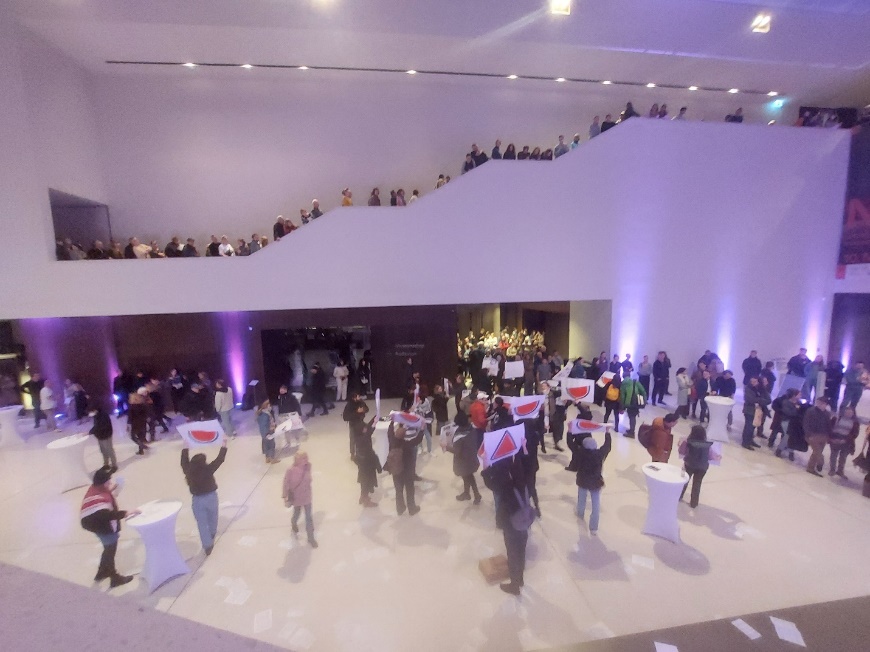
Saad, who has spoken to me on the podcast about his work, was that independent journalist. He is a relentless provocateur of political action and a founding member of Unrest Radio, which describes itself as an “autonomous space for the socio-political documentation of unheard voices”. Whoever has attended the Münster demos or events will almost certainly encounter Saad and his camera, rigorously documenting everything that can be documented. He tells me that he and his colleagues at Unrest Radio are committed to giving a platform to all cancelled voices, otherwise rarely featured in the local mainstream. Saad calls it “an audio declaration of oppression.”
That moment was a sad but necessary moment of revelation for me, as a resident of Münster and as a journalist myself, of what the press was capable of in a place like Germany when matters came to Palestine.
“A slide into fascism,” is how J describes the current climate in Germany - one that goes unnoticed and unacknowledged by most outside the solidarity circles.
On that evening at LWL Museum, Saad was approached repeatedly by the local journalist who insisted on taking his picture, even though he did not consent to it at first. As police members put up tape to separate the disrupting activists from the rest of the museum attendants, the same journalist took initiative to help the police move the tape towards the activists, actively aiding in cornering them (!) That moment was a sad but necessary moment of revelation for me, as a resident of Münster and as a journalist myself, of what the press was capable of in a place like Germany when matters came to Palestine.
War… Israel’s Most Profitable Business
14-02-2024
This was why I went on to ask Saad later on about Unrest Radio’s decision to give much of its platform to covering the Gaza genocide and exposing Germany’s complicity and political contradictions. The radio has published several podcasts that have addressed German media’s complicity, police brutality, racism in institutions and society, and others that have features testimonies from Gaza[12], from Holocaust survivors against genocide[13], and from Jewish activists exposing unforgivable German contradictions[14]. The radio has also covered in depth the case of banning a student cinema club from screening the film “Roadmap to Apartheid”, heralding the occupation of a university screening hall to screen and discuss it despite bans.
Saad explains that the radio is based in the idea of documenting what often goes undocumented in Germany, through podcasts, coverage, and a model of independent citizen journalism. Hence, it has naturally engaged, since the beginning of the genocide, in amplifying the unheard voices of the Palestinian struggle and battling the local media’s distorted coverage about Palestine and the solidarity movement in Germany. But as a Bangladeshi citizen living in Germany, Saad also believes he has an urge and a duty as a descendant of ancestors who lived under brutal British colonial rule for more than 200 years to speak about Palestine today. “This German society will not stand up for Gaza. So we have to stand up for Gaza,” he says.
That night at the museum, all the activists were obliged to give their IDs and places of residence to police officers, and were told that they would be receiving a letter by post with the legal consequences for trespassing. As a journalist, Saad was not stopped to be identified. However, he tells me, that he was surprised to find a police letter in his mailbox a couple of days later. “How could they know my name and address if they didn’t ask me that day?” He fears that police surveillance is uncurbed beyond any measure[15].


Cover art for posts/podcasts by Unrest Radio (Courtesy of Unrest Radio)
Students for Palestine
In 2023, the Senate of the Westfälische Wilhelms-Universität (WWU) Münster voted in favor of removing the university’s namesake, Wilhelm II, from its name, opting instead for the name Universität Münster. This came almost five years after a number of students suggested the rename, demanding to distance the university from a questionable historic figure believed to have abetted or at least been tolerant towards Nazism. The main building premises of the university today is what once was the grandiose palace, or “Schloss”, of Wilhelm II himself. This place has taken ample time to reconsider what it stands for, in name and essence, and it seems it is now confronted with questions of greater complexity: where does it stand from colonialism, genocide, and students’ freedoms of speech, assembly and political action?
It was in these same alleyways halls, offices, and classrooms that the activist group called Students for Palestine was inevitably born, voicing urgent demands at a time of genocide. The group describes itself as an internationalist solidarity group, “standing with Palestine and advocating for free speech and against the ongoing genocide,” as its Instagram biography briefly explains. It was established in the wake of the Gaza genocide, in December 2023. This followed a call for action from Waffen der Kritik (Weapons of Criticism), another Marxist student group active in Berlin, Bremen, Kassel, Leipzig, Münster, Munich, among other German cities and universities, which invites students to self-organize and mobilize to “make a contribution to the class struggle”, as per their Manifesto, and towards “a world without exploitation and oppression.” This time, Waffen der Kritik was calling for action for Gaza, and student activists from the University of Münster were quick to heed the call.
J (pseudonym), a member activist of the Students for Palestine Münster[16], arrived in the city in 2022 from the USA. Less than a year later, she had the chance to discover firsthand the dynamics of repression and censorship within campus activities at various levels. J is not a stranger to activist work, yet here in Germany, she tells me that time and time again, she has felt shock and disbelief at the blunt methods used in the academic institution and beyond to stifle pro-Palestinian voices. “A slide into fascism,” is how she describes the current climate in Germany, and one that goes unnoticed and unacknowledged by most outside the solidarity circles.
“The student union AStA passed a resolution called the BDS Beschloss that essentially bans anything deemed as anti-Semitic. And as can be observed over the last year especially, anything can be described that way recently – anything that has to do with showing solidarity with Palestine or with questioning the actions or the existence of Israel (…) [is described as such],” she explains.
Students for Palestine’s demands stressed the cessation of all cooperation with Israeli institutions, reminding that what is being committed in Gaza can also be described as “epistemicide”.
In Germany, when it comes to the Palestinian struggle, the “Left” is simply unreliable. The work of activism for Palestine in Münster – rather, in Germany altogether - is quite lonely.
This resolution essentially puts a ban on the activities of the group on campus altogether, which has forced the activists to circumvent the ban and create spaces for themselves in areas close enough to the vicinity of the campus and to other students’ radars, because they could no longer operate on campus ground without risks amounting to ex-matriculation and serious legal consequences. J adds that this clamp down comes not only from police and university, but also from German society itself, which easily brands Palestine solidarity as an anti-Semitic crime. “What we do is we go adjacent,” she tells me, “a lot of trying to move around the rules, finding loopholes,” in the constant attempt to continue the work despite these sizable obstacle that is their “legal way” to repress free speech.
In January 2024, Students for Palestine Münster shared an open letter to the university demanding the Rectorate “takes a public position against the ongoing genocide of the Palestinians in Gaza” and “fulfils its responsibility of solidarity with the academic sector of Palestine and with the entire Palestinian people in the face of genocide.” The demands include working towards an immediate ceasefire, the immediate and unhindered entry of food and essentials to Gaza, an end to all German financial and military aid to the State of Israel, the release of all Palestinian political prisoners, an end to the Israeli occupation, in addition to publicly and unambiguously recognizing and naming the current Israeli attack as genocide.
The demands also stress the cessation of all cooperation with Israeli institutions, reminding that what is being committed in Gaza can also be described as “epistemicide” (the annihilation of educational and cultural resources, spaces, and individuals). The letter asks for the provision of institutional support of students, researchers, and teachers affected by genocide, in addition to stressing the necessity of ensuring measures that protect the freedom of expression for pro-Palestinian and marginalized voices.
Needless to say, none of those urgent demands were met. A serious response is yet to be received. The students, once again were left to fight a solitary fight.
What “Left”? It’s a lonely struggle
Numerous cultural, academic, and communal spaces have shut their doors in the face of Palestine solidarity events, Saad tells me. He counts a list of repressors of Palestinian voices: The State, the academic institution, and the left. “Yeah.. The “Left” activists in Münster,” he retorts. Ramez confirms it and goes on to make a comparison with Leftists parties, groups, and spaces in various countries of the world who align themselves with the anticolonial struggle of the Palestinian people as a natural part of what they believe in. He lets out a frustrated chuckle, “But in Germany… the situation is like this. A lot of the “Leftist” groups have a completely different narrative. They, in fact, support the “reason of state” and are complicit with the German State (…) We also see repression by these [leftist] groups.” His sentiment and Saad’s are mirrored in J’s experience of “discovering” the German Left. “You have people who are… [laughs] anarchists - self-proclaimed anarchists, self-proclaimed leftists- people who are supposedly dedicated to these ideals of equality and want to work towards revolution […] And as soon as you bring up this issue, it becomes abundantly clear that they are actually much closer to be in line with the state than to any idea of real change,” she explains.
The so-called Antideutsche (Anti-Germans) are a truly baffling example of a pro-Zionist “Leftist”, “Antifascist” group. Their dedication to supporting the State of Israel is a dedication to supporting Germany’s reason of State, too, which makes the group a hot mess of contradictions, leading it up to the point of fully supporting a genocidal, colonizing state against the colonized.
Palestine solidarity groups and individual activists with whom I’ve spoken in Münster seem hyper aware of the fact that there is much yet to be done and much to be overcome. After all, the genocide in Gaza has not stopped. In Germany, when it comes to the Palestinian struggle, the “Left” is simply unreliable, and the work of activism for Palestine in Münster – rather, in Germany altogether - is quite lonely. “Even if Israel stopped the aggression tomorrow on Palestine and Lebanon, this group’s work wouldn’t be over. The solidarity would still be needed- very much needed,” J says.
It is a lonely struggle, but it is also quite persistent…
The alternative lies in pressing on. Palestine solidarity networks exist with like-minded groups, such as Kufiya Network[17], which tries to coordinate efforts all over the country. Some have stressed the absolute need for self-critical evaluation, and escalation a year on, while others expressed frustration at the amount of time spent in just trying to avoid harassment and repression from many different directions while Gaza bleeds on. In the disorientation that is repression, a compass clear as day points the way to go: “We have to center Gaza and center the resistance. We have to remember that,” Marry, a friend and activist with Palästina Antikolonial, says.
- The podcast includes testimonies and opinions from Muath, Saad, Ramez, Merry, and J, who are activists in various politically active groups in solidarity with Palestine. ↑
- The University of Münster was until as recent as September 2023 still formally called Westfälische Wilhelms-Universität, a namesake of Wilhelm II, Germany’s last Kaiser. The name of the University was changed to avoid the link to the figure believed to have helped Nazism into power. ↑
- 8.6% of the population, according to Stadt Münster official website. ↑
- Ramez’s account of repression of the group Palästina Antikolonial can be heard in the podcast. ↑
- https://www.asta.ms/aktuelles-layout?id=124 ↑
- The Jewish Voice for Just Peace in the Middle East: https://www.juedische-stimme.de/ ↑
- https://www.juedische-stimme.de/statement-zur-stellungnahme-des-asta-munster-zur-gruppe-palastina-antikolonial ↑
- https://mondoweiss.net/2021/12/german-police-remove-pro-palestinian-students-from-campus-meeting/ ↑
- Between October 2023 and August 2024. ↑
- In an article Feldman wrote for the Guardian, titled ‘Germany is a good place to be Jewish. Unless, like me, you’re a Jew who criticises Israel’. Published on 13 November, 2023. ↑
- See the Archive o̶f̶ ̶S̶i̶l̶e̶n̶c̶e for more on this. It is a “crowdsourced archive documenting silenced voices in Germany.” https://linktr.ee/archiveofsilence?fbclid=PAZXh0bgNhZW0CMTEAAaZDDXTZZowib_nSaHLJLYN3EhEhSBc3BOFj0fUmpweVCdHT4n7LzHa3rWc_aem_-IcHpuMnR4BZe6E_ht9piQ ↑
- The testimony of Muath Abu Maaliq from Gaza: https://www.instagram.com/p/C--ZjCesHgV/ ↑
- Interview with Marione Ingram, Holocaust survivor and civil rights activist: https://www.instagram.com/p/DBWl1FAhRtr/ ↑
- Interview with Iris Hefets of Jüdische Stimme: https://www.instagram.com/p/C0MgUeHCGjJ/ ↑
- Listen to Saad’s experiences of activism in media and beyond on the podcast. ↑
- J’s testimony about the oppression of Palestine solidarity in the podcast explores her experiences and opinions further. ↑
- Read their statement here: https://kufiya-netzwerk.de/statement/en/ ↑


